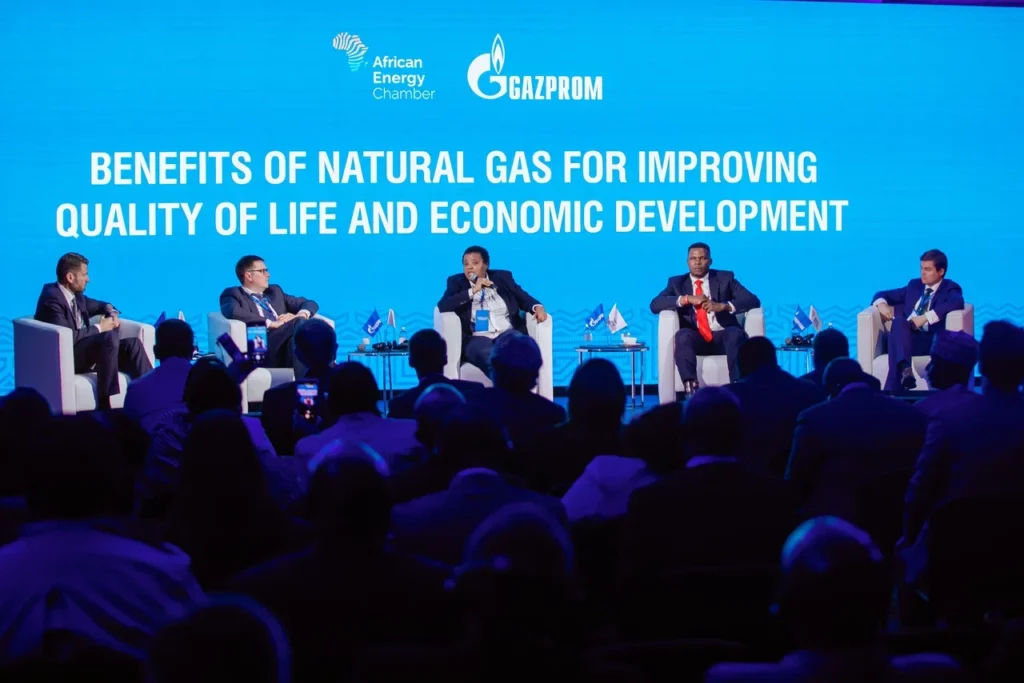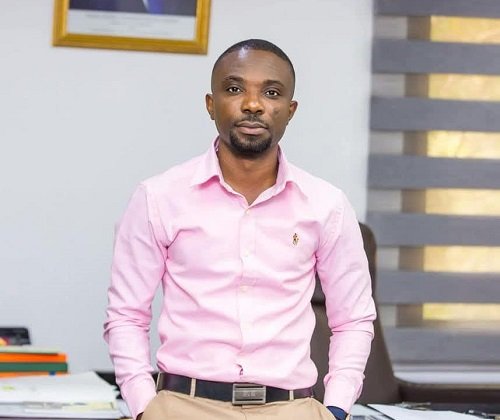Hot!
Roundtable on Benefits of Natural Gas for Population and Economy held in South Africa

The International Roundtable titled “The Benefits of Natural Gas for the Population and the Economy” was held on Thursday 22nd June 2023 in Johannesburg (South Africa).
The event took place under the auspices of the African Energy Chamber with support from Gazprom.
H.E Ilya Rogachev, Ambassador Extraordinary and Plenipotentiary of the Russian Federation to the SAR and concurrently to the Kingdom of Lesotho, Dmitry Khandoga, Head of Department at Gazprom, NJ Ayuk, Chairman of the African Energy Chamber, as well as representatives of the business community, energy experts and journalists from across the African continent participated in the Roundtable.
The participants discussed the role of natural gas in the sustainable development of Africa, noting that most African countries continue to face the problem of energy availability with their energy consumption significantly below the world average.
It is estimated that Africa will generate over 60% of the global population growth by 2050. Taking into account the current urbanization trend, the region is expected to experience significant economic growth, which will be accompanied by a two-fold increase in energy consumption. In particular, the demand for natural gas will increase by 2.5 times.
It was highlighted at the event that an increase in natural gas production would help meet the growth in gas demand on the African continent. However, as of today, the bulk of gas produced in Africa is exported abroad. For instance, every third person in Nigeria, the largest African LNG exporter, has no access to energy. This is why it is the availability of energy for the industry and population that will be of primary importance for Africa’s dynamic development.
The participants of the Roundtable discussed the benefits of using natural gas as compared to other types of energy sources. It was noted that air pollution is a major concern for the continent. According to the statistics, polluted air is among the leading causes of premature deaths on the continent. This problem can only grow bigger over time. It was highlighted that all areas of activities making the biggest contribution to air pollution can be effectively addressed through the use of natural gas.
The potential role of gas in solving the food problem was also highlighted at the event. Besides the fact that the use of gas does not require large areas for electric power generation and does not lead to the reduction of cropped agricultural areas, gas is also a valuable raw material for the production of fertilizers which make it possible to significantly increase crop yields.
Presentations were delivered at the Roundtable by the representatives of Gazprom and the Gazprom Group companies, namely, Gazprom Gazifikatsiya, Gazprom Energoholding and Gazprom Helium Service. Their presentations provided information about the activities of Gazprom and the extensive scope of the Company’s competencies along the entire value chain of the gas business.
“Considering that the Government of the Republic of South Africa pursues the economic decarbonization policy, gas can become an effective solution to satisfy the demand for energy, as renewable energy sources cannot provide uninterrupted energy supplies. Therefore, I believe that Gazprom’s experience in natural gas liquefaction and gas pipeline construction projects can be of interest to our South African partners,” Ilya Rogachev added.
“Wider use of natural gas will help Africa solve a number of problems, from economic to social and environmental ones. We are confident that it is essential for Africa to discover all the advantages brought about by this type of fuel. We see potential in cooperation with African countries and we can offer them our unique expertise and our experience in technology. Gazprom is open to discuss constructive and mutually beneficial proposals which could facilitate economic development and improve the lives of people in African countries,” Dmitry Khandoga said.
“More than 600 million people in sub-Saharan Africa do not have electricity. And 900 million people, most of them women, do not have access to clean cooking technologies – these technologies are either absent or there is a lack of them. Even if we look at this single problem alone, we see that it makes sense to use the rich gas resources of the continent. As Africa needs industrialization, the use of affordable and abundant natural gas will encourage the creation of a significant number of jobs, as well as possibilities for the strengthening of potential, economic diversification and growth,” NJ Ayuk added.
Hot!
Education free, but parents have roles to play – Anloga DCE

Madam Sandra Seyram Kpedor, the District Chief Executive (DCE) of Anloga in the Volta Region, has emphasised the importance of parental involvement in children’s education, stating that education is free, but parents need to do more to support their children.
She said parents, teachers, and students must be involved in addressing the challenges facing the district’s education sector, particularly the poor Basic Education Certificate Examination (BECE) results.
Madam Kpedor outlined some key roles parents should play to promote their children’s education, including providing a conducive learning environment, monitoring their children’s progress, and supporting teachers.
The DCE highlighted some challenges the district faced such as inadequate infrastructure and a shortage of teachers, which have also contributed to the poor BECE results and called on well-to-do parent to help solve the situation through and other supports.
To address the issues, she also announced that plans have been taken to utilise the district’s common fund to implement educational projects, such as constructing school blocks and teachers’ bungalows at Sodzi community, and 2-unit classroom blocks each at Akplorwutorkor and Tegbi-Afedome respectively, among others.
Madam Kpedor also noted that her office had earlier notified the Ministry of Education to deploy more teachers to the area to improve teaching and learning, and encouraged students to work hard and strive for excellence, and work beyond their limit to succeed.
“To my wonderful and beautiful girls, you have to know it clear that women and girls have equal opportunities to compete with men for greater achievements,” she indicated.
The DCE cited her own achievement as a testament to the fact that women can excel in leadership positions, alongside Vice President Nana Jane Opoku-Agyemang, and stressed that girls were no longer limited to domestic roles but can pursue their dreams and become leaders.
Additionally, she mentioned that a meeting was held earlier with assembly members, and other stakeholders to address the district’s educational challenges and improve academic performance.
She promised that the district’s education oversight committee and stakeholders would work together to address the challenges and improve the district’s BECE results and called for parental involvement and support to boost the district’s education sector for children to chase their dreams to become future leaders for the success of the district and the nation.
She urged parents not to leave everything to the government but rather help in the provision of some necessary materials such as textbooks, exercise books, pens, pencils, food, and guidance to children for the successes of young learners. –GNA
Join our WhatsApp Channel now!
https://whatsapp.com/channel/0029VbBElzjInlqHhl1aTU27
Hot!
Dennis Miracles Aboagye criticises NDC’s “no fee stress policy” implementation

The spokesperson for Dr. Bawumia, Dennis Miracles Aboagye, has criticised the implementation of the NDC government’s No Fee Stress policy, arguing that the programme has failed to deliver on its core promise.
According to him on Starr fm, the policy, which was introduced to ensure stress free payment of fees for level 100 tertiary students, has rather turned into what he described as post stress support.
He explained that students are required to pay their fees first before applying for reimbursement, a situation he believes defeats the purpose of the policy.
He questioned claims by government officials that the policy has been successful and that citizens are happy.
In his view, such claims do not reflect the lived realities of many Ghanaians. He stressed that while some people may appear satisfied, many others continue to struggle.
Dennis Miracles Aboagye pointed to the situation of trained teachers and nurses who have been picketing for nearly six months, demanding employment.
He noted that government responses suggesting it cannot accommodate all of them contradict claims of economic stability.
He further argued that economic indicators such as a stable currency mean little to people who are unable to secure jobs or access promised support.
He observed that telling an unemployed teacher or a struggling student that the cedi has strengthened does not address their immediate challenges.
On the issue of tertiary education, he maintained that no level 100 student benefited from stress free fees in 2025, despite the policy being announced.
He added that in 2026, students have already reported to school without receiving the promised support.
He insisted that asking students to pay fees first and seek reimbursement later amounts to support after hardship, not stress free education.
According to him, this approach goes against what was promised during the policy announcement.
Dennis Miracles Aboagye questioned why a government that presents the economy as strong is unable to fulfil what he described as simple and clear promises.
He added that there is a fundamental problem with the way the economy is being managed and indicated that he is prepared to explain his position further.
By: Jacob Aggrey







